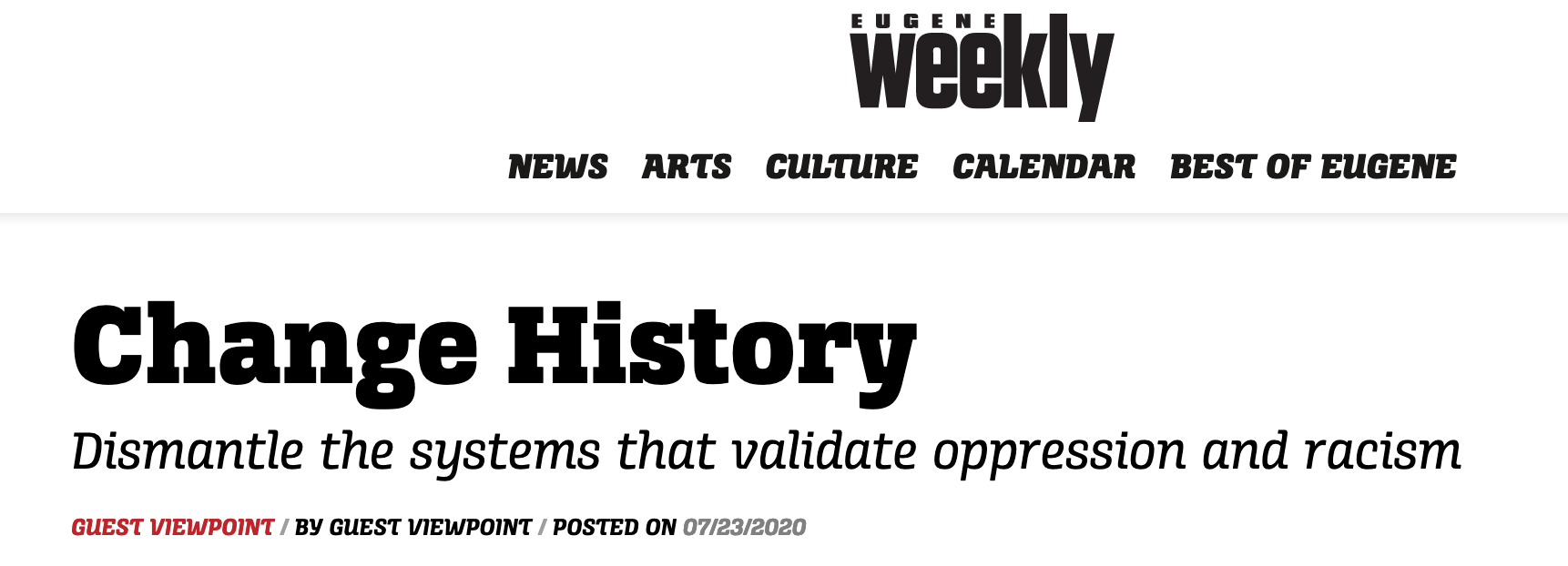Published by the “Eugene Weekly” July 23, 2020
By Michelle Holman
White people in America are clearly steeped in a very real moment. We are being urged to listen, reckon, reflect and act. We are being asked, in so many ways, to open our ears, our eyes, our hearts and our brains in ways that many of us have never done before. And in doing so, there will certainly be feelings of guilt, remorse, sadness, outrage, confusion, compassion and a myriad of other emotions and impulses coursing through us.
“Cries of ‘I can’t breathe’ call out in compelling shorthand, America’s enduring racial chasm in every measure of well-being: health care and infant mortality, wages and wealth, unemployment, education, housing, policing and criminal justice, water quality and environmental safety.–William Barber II, Liz Theoharis, Timothy B. Tyson and Cornel West in a NYT op-ed
However, if done right, what can come from this breakthrough societal moment cannot be denied. Taking the lead from communities of color, what will emerge is a clarity to drive forward the efforts needed to break the cycles of oppression and racism — to dismantle the systems that validate oppression and racism.
Together, we will build a just system that honors and respects all life. This is not only possible, but inevitable.
In a recent New York Times op-ed drafted by William Barber II, Liz Theoharis, Timothy B. Tyson and Cornel West entitled, “What the Courage to Change History Looks Like”, they said this:
“Cries of ‘I can’t breathe’ call out in compelling shorthand, America’s enduring racial chasm in every measure of well-being: health care and infant mortality, wages and wealth, unemployment, education, housing, policing and criminal justice, water quality and environmental safety. The bills that bustle through our legislatures offer narrow reforms of police procedures and bypass the fullness of what the protesters are saying: The children of privilege are protected not by a higher grade of policing, but by deeper layers of resources and that is what ought to protect all of our children.”
A critical piece — one that does not receive the attention it deserves to those “interlocking” platforms — is the call for community control
The collective goes on to sharpen their ridicule of legislative bodies by saying, “You cannot solve what is happening to Black people in this country by ‘mere policy tinkering,’ but that you must dismantle “the interlocking systems created by and for white supremacy and gender-based oppressions.”
With dismantling comes the opportunity to rebuild, and how we rebuild will be crucial. Seeing the world as a collection of systems is so critical. It’s why the phrase “interlocking systems” is so powerful — through the truth it speaks.
It is also why the Movement for Black Lives (M4BL) lays out various demands versus narrowing their focus on just the brutality of policing towards Black people. A critical piece — one that does not receive the attention it deserves to those “interlocking” platforms — is the call for community control:
“We demand a world where those most impacted in our communities control the laws, institutions and policies that are meant to serve us — from our schools to our local budgets, economies, police departments, and our land — while recognizing that the rights and histories of our Indigenous family must also be respected.”
See the full opinion piece in the “Eugene Weekly” HERE.

